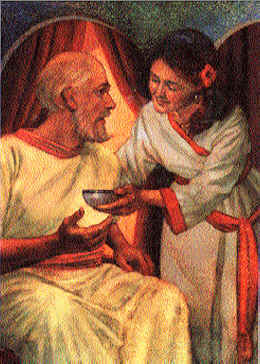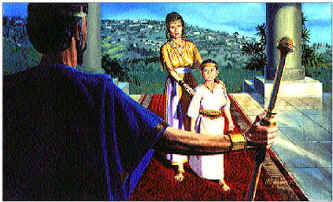The Bible: Bathsheba: Mother and Queen
The following story is based on events in 2 Samuel 11–17 and 1 Kings 1–2.
Dozing beneath the tapestries hung to shade the roof, the teenage girl smiled and opened her eyes at the sound of familiar voices. She peered through the wall hangings to see her grandfather Ahithophel greet King David in the courtyard below. The powerful king of Israel almost ran in his eagerness to embrace her grandfather, a close friend and counselor to the king.
Although she had seen David many times, and heard the adventurous stories that her father, Eliam, one of David’s 30 mighty warriors, told about the king, it was always a thrill to see the man God had chosen to rule Israel. She noticed how strong and handsome King David was, so like her own father standing tall and militarily straight by the king’s side. Then she noticed another warrior stride up — Uriah the Hittite.
 |
| Bathsheba hands her grandfather a cool cup of water before his meal. “My beautiful Bathsheba,” Ahithophel says as he accepts the cup with a smile. |
Bathsheba felt her face redden as she quickly drew back within the woven coverings. She thought of the arrangements her father was making for her to marry Uriah, and she certainly didn’t want Uriah to see her staring down at him.
No doubt the king and his men had come to discuss some military matter with her grandfather, perhaps to use his keen insight to plan a battle against the Ammonites. She hurried on down the steps to see if her grandmother might need help in preparing food for their royal visitor and his men. But not today. After about an hour with David, Ahithophel returned to his house alone. The king, along with Ahithophel’s son (Eliam), Uriah and the other soldiers, had to leave Giloh to return to Jerusalem.
Bathsheba handed her grandfather a cool cup of water as he relaxed before his meal. “My beautiful Bathsheba, and as usual, as kind and thoughtful as you are beautiful,” Ahithophel said as he accepted the cup with a smile. “Before long, my little girl, you will be a happily married woman. What do you think about that? Will you still come to see your grandfather once you’re married to the mighty Uriah?”
“Of course, grandfather. You know I will never love anyone as much as I love you,” said Bathsheba, pulling back her long hair as she knelt to kiss him on the top of his head. “A likely story, my girl, with such a man as Uriah as your husband,” Ahithophel retorted with a laugh. “Many of the daughters of Israel must envy you, marrying King David’s finest warrior.”
Articles in “Exploring the Word of God: Historical Books”
|
Ahithophel’s smile faded as he continued: “And, not only is Uriah courageous in battle, he is a disciplined and dedicated man. I have high hopes for him. He will go far in Israel. That is what is most important, child. I would not be pleased to have my granddaughter marrying anyone less.”
Almost a year later, Bathsheba had time to think of her grandfather’s words many times. Adjusting to the life of a soldier’s wife wasn’t easy. Now she understood her own mother’s loneliness and constant worry when her father was gone for months to the battlefield. Daily she prayed to God to bring Uriah home safely.
One spring day, around the community well, she anxiously listened to the talk of the other soldiers’ wives. As they discussed the day’s rumors from the war, she wished she could feel as calm as they appeared. That evening at her apartment next to the palace, Bathsheba carried water to the roof and prepared to bathe. The time of her purification was over. She undressed and carefully washed herself as instructed by her mother some years before.
High above her, King David paced back and forth on the roof of his palace. Maybe he made a mistake not going with Joab and the army to Rabbah, he thought. As he made yet one more turn walking around the roof, he suddenly spotted Bathsheba. There’s a woman down there, he thought, and she’s taking a bath! He found when he knelt down he could see her even better through the tapestries.
David was stunned. He had not seen such exquisite beauty. He couldn’t take his eyes off her. As soon as Bathsheba had completed her bath and wrapped herself in a robe, David hurried downstairs. Who was this beautiful woman? He must know. “David sent someone to find out about her. The man said, ‘Isn’t this Bathsheba, the daughter of Eliam and the wife of Uriah the Hittite?’ Then David sent messengers to get her” (2 Samuel 11:3-4).
Bathsheba was bewildered. Why was she being hurried by the king’s servants through the back alleys from her house to the palace? She hoped this unexpected invitation from the king didn’t mean something had happened to Uriah. When the servants reached the king’s private rooms, they quickly released Bathsheba, bowing as they left.
“Bathsheba, my dear. Please come in. How gracious of you to accept my invitation on such short notice. Would you like some wine?” “She came to him, and he slept with her” (verse 4). David was the king; Bathsheba was a subject; it could have been difficult, even dangerous, to refuse.
Several weeks after her sexual relations with King David, feeling queasy and trembling, Bathsheba sat on the edge of the bed she had shared with Uriah and wept. There could be no doubt. She sent her terse message to the king, “I am with child.” Under Israel’s law, she knew she could receive the death penalty for adultery. She did not know, however, that her message to King David would mean her husband’s death, not her own.
Motivated by his guilt and his concern for Bathsheba, after several unsuccessful attempts to have Uriah return to his wife’s bed, David tried to cover up the sin by having Uriah killed in battle. Bathsheba’s life would never be the same, nor would David’s. Though David married Bathsheba and sorrowfully repented of his adultery with her and the murder of Uriah, this couple would see one tragedy after another strike their families.
David and Bathsheba’s child would die soon after birth. David’s son Amnon, by one of David’s other wives, raped his half-sister Tamar. To avenge his sister, another of David’s sons, Absalom, killed Amnon.
Perhaps as a result of being embittered by David’s treatment of Uriah and Bathsheba, Ahithophel turned on his old friend and helped David’s son Absalom as he attempted to forcibly take the throne from his father. It was on Ahithophel’s advice that Absalom violated his father’s concubines on the roof of the palace in the sight of all Israel (2 Samuel 16:21-22).
A few years after Absalom’s rebellion and death, when it was obvious David was near death himself, David’s son Adonijah attempted to have himself crowned king. Seeing the danger, the prophet Nathan, the same man God used to confront David with his sin, knew where to turn — Bathsheba.
 |
| Bathsheba presents Solomon to his father, King David. Through the prophet Nathan, God called Solomon “Jedidiah,” meaning “loved by the Lord” (2 Samuel 12:24-25). |
Why did Nathan go to Bathsheba? Because over the years he had gained great respect for this woman. He knew David had confidence in his wife. The prophet had noted the good influence Bathsheba had on her children. Quietly, Bathsheba listened to Nathan’s plan. She then went before the ailing king and asked, “Has not the king promised that our son Solomon would be his successor?”
After also hearing from Nathan about Adonijah’s premature “coronation” celebration, David realized he must act quickly to save all their lives. At David’s command, Solomon was immediately crowned king of all Israel.
Trusting to a fault, Bathsheba was later used by Adonijah to try to get permission from Solomon to take Abishag, who had “waited on” David (1 Kings 1:4), as a wife. Solomon saw that Adonijah was trying to strengthen his position as heir to the throne; Solomon decided that was reason enough to have him killed.
It is obvious from Solomon’s warm greeting of his mother how much he loved and honored her. Looking to her as an important adviser, Solomon had a throne for her placed at his right hand — the first king of Israel to have a queen mother in his administration.
Overcoming the ignoble beginning of their lives together, patiently suffering the consequences of their sin, both Bathsheba and David learned from their mistakes and grew in the knowledge and righteousness of God. Although there is some controversy over whether the Lemuel of Proverbs 31 refers to Solomon, if rabbinical commentators are right, the imperial mother here advising her kingly son is Bathsheba.
Author: Sheila Graham

